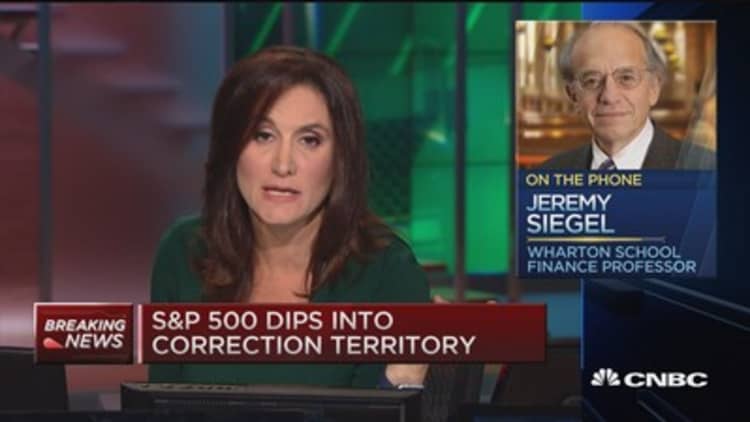
Stocks could test lows reached after a brutal market open Monday, but equities should burst through a summer slump in the coming months, longtime bull Jeremy Siegel said.
"Once this storm passes, I think the fourth quarter could be very good," Siegel, a Wharton School finance professor, noted in a CNBC "Fast Money: Halftime Report" interview.
After a brutal drop last week, the Dow Jones industrial average and Nasdaq traded in correction territory, more than 10 percent lower than their highs reached this year. The Dow briefly plunged nearly 1,100 points shortly after the market open before recovering.
Read MoreDow down about 200 points, some tech names turn positive
The also dipped 100 points in the morning. The index gained ground into the afternoon, trading about 1 percent lower around 1,950.
Siegel noted that August and September typically yield choppy trading and may not provide the best gauge for market health. Earlier this month, he predicted a potential correction and said trading could turn "very rough."
The noted bull took a less optimistic tone on a previous call that the Dow could reach 20,000 this year. However, he contended the index, which has fallen nearly 9 percent this year, could still turn positive by the end of 2015.
"I still think we're going to be up for the year, and 19,000 is not at all impossible," Siegel added.
Read MorePotential correction could be 'very rough': Siegel
But not all traditional bulls remained as optimistic. Piper Jaffray on Monday cut its S&P price target from an optimistic 2,350 down to 2,135.
"We no longer believe the odds are in our favor for the S&P 500 to reach our prior target of 2,350 by year end, since history shows that recoveries from pullbacks/corrections have generally taken about two to four months to materialize," Craig Johnson, technical market strategist, said in a note.
—CNBC's Jeff Cox contributed to this report.


